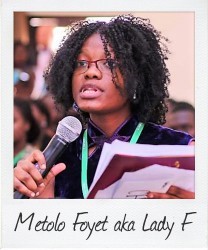“Africa’s alarming deficit of good leadership”
April 5th, 2018 Democracy requires both leadership and institutional strength, writes Metolo Foyet, 20, a Commonwealth Correspondent from Cameroon now living in Niger, who argues for robust changes that will allow economic growth and trust in the social contract.
Democracy requires both leadership and institutional strength, writes Metolo Foyet, 20, a Commonwealth Correspondent from Cameroon now living in Niger, who argues for robust changes that will allow economic growth and trust in the social contract.
Decades ago, Africa witnessed a multitude of coups. Many were organised by disenchanted armies who disliked bad governance and cared for the people. It is argued that today, if the army leaves bad leaders in power, it is because military men are corrupt and army leaders are pampered by the government leader. They don’t see why they should take any action against their benefactor, no matter how despised he is by the people.
Democracy is not thriving in Africa, partly because the politicians and the army are doing business. It is not economically profitable for the army to organise coups. Our forefathers did not Africanize the institutions they inherited from the colonial masters. Whilst these institutions have been updated and upgraded in the West, the forefathers’ successors could not think outside the box. Others cling to a structure that allows them to loot. Thinking would mean strengthening the institutions, reinforcing and applying the law as well as responding to the needs of the people, and thus being accountable.
One reason terrorists are briskly spreading in Africa is that its institutions are weak and predictable. People will continue to be killed on the continent because those orchestrating the terror know how those institutions think, strategise and what they are capable of. Ironically, institutional inefficacy is also the reason some frustrated orchestrators (who may have had solutions but were ignored) have chosen terror in order to be heard.
When governments do not think about and listen to the people, when they strategise only about filling their pockets, when the only things they are capable of are incompetence, greed, lies and deception, it is only normal that conflict arises. For instance, some people litter not because they are illiterate, but because they despise the government’s carelessness and will do anything in their power to make its task more challenging.
It would appear some African politicians do not have aspirations for the people. When leaders within the state fight each other to stay in power and quarrel about the privileges provided to them, the people are watching, waiting for the fight to end and a chance to enjoy the leftovers. Then the people also quarrel over the leftovers, along the margin of power.
When the state does not work, society finds alternatives to survive. If the state cannot and will not provide social welfare for the people, the latter will provide it for itself. This explains the high rate of criminality on the continent, because the people are left to provide for themselves with the leftovers. It is the lack of decent treatment of people and the exploitative approaches of the corporate world in Africa that make people embezzle and become irrational.
Radicalisation occurs because people feel unimportant. Too often, African authorities do not dignify the people. This can be observed through the quality of language they adopt in public and private settings. Violent language has incited people to war (e.g. genocide in Rwanda). Elite politicians disrespect citizens and tend to dehumanize the people in their speech and through their actions, so much that the people grow angry and bitter against such contempt.
Fear and loyalty are scarce in the modern African state and apparatus, to the extent that some pastors ask not to be blamed for the indiscipline in their countries. When you let your church accept tithes paid out of embezzled money, aren’t you contributing to the indiscipline? How can you be accepting money from and blessing criminals and expect not to be blamed? These pastors are destroying the image of Christianity, and since our leaders make oaths on holy books but keep playing around with our lives, it might be time we consider making oath on local gods, known for their irrepressible strikes when covenants aren’t respected. That is the only way we can keep these leaders accountable.
It is only in Africa that an increase in the GDP does not translate into our children eating an extra bowl of rice or more people being employed. Africa’s population will be 1.2 billion more than India and China in the near future. Africa will need to create 80 million jobs per year, or else terrorism might be the next sexiest job. Conflict entrepreneurs, start brainstorming now!
Photo credit: wuestenigel Green Bitcoin Chart via photopin (license)
…………………………………………………………………………………………………………………
About me: I am a social entrepreneur with focus on education, agriculture and cybersecurity.
I have a track record of adding value to organisations by delivering innovative projects that engage stakeholders and expertise in public affairs, strategic communications, translation, research and development, product design, grassroots development and project management across the not-for-profit and private sectors.
I paint, write, and am an environmental, travel and sports enthusiast. I envision a career in the public service, especially the UN.
…………………………………………………………………………………………………………………
Opinions expressed in this article are those of the author and do not necessarily represent the views of the Commonwealth Youth Programme. Articles are published in a spirit of dialogue, respect and understanding. If you disagree, why not submit a response?
To learn more about becoming a Commonwealth Correspondent please visit: http://www.yourcommonwealth.org/submit-articles/
…………………………………………………………………………………………………………………




